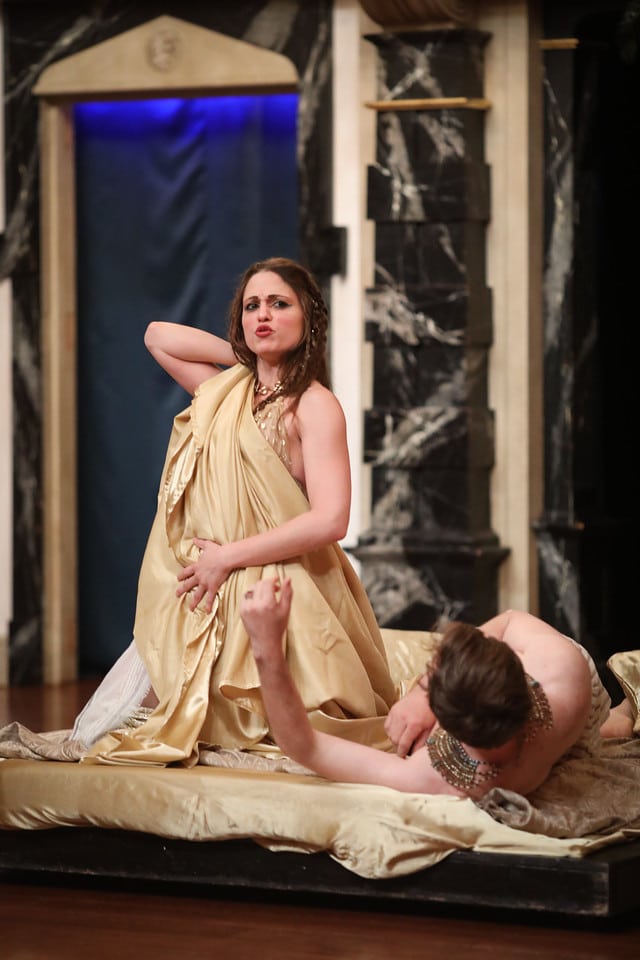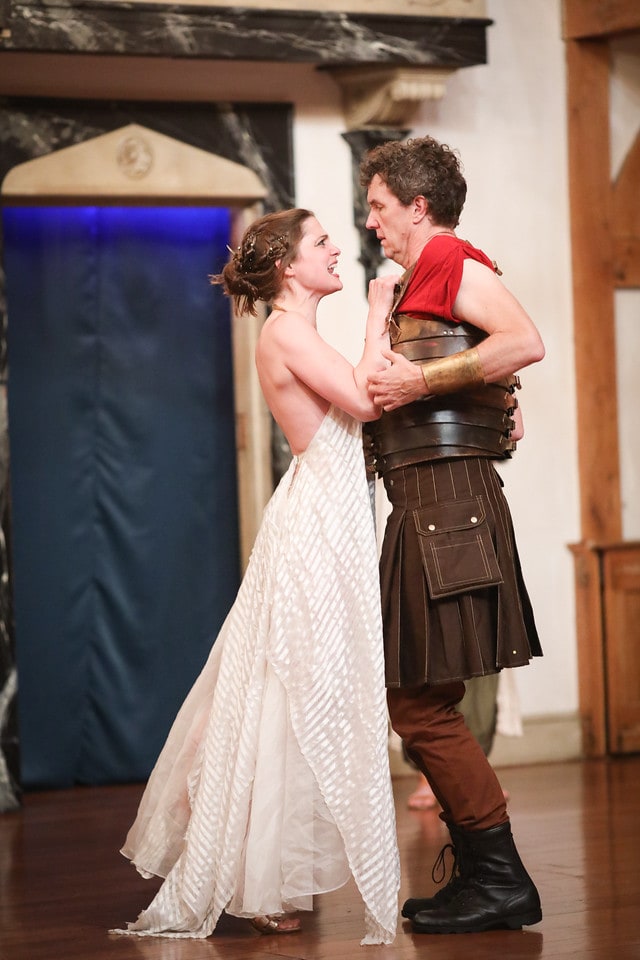Of all of Shakespeare’s history plays, Antony and Cleopatra is the most complicated and thankless to stage. You’ve got shifting alliances, battles won then lost, and then you’ve got the bizarre temperament of the title characters, who can’t seem to stay on the same page—let alone the same thought—for longer than it takes to wink or flick a finger.

The play is rich with character studies, however, and is a goldmine for actors who have opportunities galore to whisk you away on an intense emotional journey—who cares if you have no idea what’s really happening, when the actors have such stunning turns?
That’s certainly the case with Zoe Speas, whose Cleopatra is one for the ages; petulant, violent, whip-smart and utterly voluptuous, she rules the entire Blackfriars space with ease. Speas leaves no room for doubt that no matter how macho Mark Antony thinks he is, in her presence, he is utterly her slave. On paper, the guys in the audience are supposed to tut-tut over how easily Antony gives over; but in her presence, everything he does, no matter how humiliating, makes perfect sense. Speas is that great in the role. And her Cleo is not the whining need-bag she’s made out to be; Speas gives her a brain and cunning that reminds us she knew perfectly well what she was doing.
It’s a treat, too, to see Geoffrey Kent play Antony here, just as he plays Antony in the Blackfriars’ companion production of Julius Caesar (read our review here); I highly recommend seeing both productions, to look for signs of Shakespeare’s continuity of thought. Although these plays were written years apart, Kent provides a clear, consistent vision of Antony that is as fascinating as Speas’ work.
Director Sharon Ott has made full use of the Blackfriars space, and doesn’t hesitate to offer us an intimate scene from the git-to, with Antony and Cleopatra playing under the sheets for all to see. Like her fellow director, Ethan McSweeny (who directed Caesar), Ott doesn’t hesitate to put the audience in the middle of the action. One of Cleopatra’s most powerful entrances isn’t from the wings but from the back of the house, and the resulting shouting match, with her in back of orchestra and Antony onstage, leaves you darting back and forth in your seat, hanging on every javelin they hurl at each other.
Constance Swain and Sylvie Davidson, as Cleopatra’s attendants Charmian and Iras, are by turns amusing and compelling, sharing as they do the wit and subtlety of their mistress. Davidson, meanwhile, also doubles as Octavia—Octavius’ sister, who is bartered away as a bride for Antony in an ill-advised political alliance. Then you have John Harrell (who plays Brutus in Julius Caesar), bringing down the house as the hapless messenger whose task it is to tell Cleopatra that Antony has married Octavia. Speas and Harrell have a brilliant sparring match, and Ott uses this ill-fated encounter as an opportunity for some outrageous slapstick; Harrell’s Messenger is lucky to leave with any vital parts intact.

The other emperor-wannabes, Pompey and Lepidus, are given solid turns by Ronald Román-Meléndez and David Watson. Poor Lepidus is regarded as a bauble, utterly expendable; his irrelevance to the main event, the fight between Octavius and Antony, is revealed in a grand party scene on Pompey’s boat, in which Lepidus turns out to be the easiest, sloppiest drunk the Empire has ever seen. (Note to audience: it takes serious sober chops to pull off a drunk scene as Watson does here, post-show research notwithstanding). As the more upright of the two, Román-Meléndez’s Pompey (the son of Pompey the Great, for those of you keeping score) has the rectitude of a true Roman, even as he goes about the stage in rough pirate gear provided by Costume Designer Murell Horton. Brandon Carter’s turn as Menas, Pompey’s frustrated assistant, is powerful, and mirrors the growing frustrations of underlings in Antony’s camp. At least in Pompey’s case, when he turns down a golden opportunity to seize power, he does it for the right reasons…
Perhaps because of the famous speeches that come out of this play, newcomers to the American Shakespeare Center might be a little confused. If you’re looking for the grand gesture, the operatic tone, the formal elegance of proscenium Shakespeare, you’re doomed to disappointment. But this is because Staunton, Virginia’s Blackfriars Playhouse space calls for a very different acting style from the one we associate with “classic” plays. We forget that Shakespeare was an entrepreneur, who doctored old scripts and stories to pack the house with everyone and anyone who had a few pennies in their pocket. The Blackfriars brings us back to those heady days when the show really had to rock the house. One audience member near me, frustrated after Act I of this production, walked away after Act II far more impressed than they thought they’d be.
The informality of line delivery that Blackfriars specializes in is truly an asset, as Shakespeare wrote an English that everyone could understand, even now, when delivered with care. That being said, for all the vitality and talent of this production, and perhaps because the company is now in the third month of its run, actors can fall prey to certain habits, speeding up their delivery unconsciously and leaving fresh audiences in the dust. Everybody onstage knows your lines, you know them perfectly, so the idea of running the words quickly and seamlessly together comes all too easily.
This is a shame, especially for a show as complex as Antony and Cleopatra. If the famous “Barge” speech begins too off-handedly and is delivered too briskly, it’s easy to forget that this is the scene in which the audience finally grasps why even Antony’s closest allies were utterly bewitched by this Greek-Egyptian queen. Speaking too quickly can also make it impossible to follow the changes in alliance, as decisive lines are delivered too off-handedly for us to grasp what the character has resolved to do. “Trippingly on the tongue” is great, but even in Blackfriars a slightly modulated pace is well worth the effort.
Running Time: Two and a half hours, with one intermission.
Antony and Cleopatra plays through November 30, 2019, at the American Shakespeare Center’s Blackfriars Playhouse, 10 S. Market Street, Staunton, VA. Purchase tickets online.
NOTE: Antony and Cleopatra is currently a part of ASC’s Fall Season, in repertory with Julius Caesar (read our review here), George Bernard Shaw’s Caesar and Cleopatra, and the world-premiere musical The Willard Suitcases. The repertory will come to a close on December 1—get busy, and get tickets!




